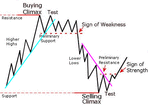So, 'patterns' are 'intentional', they are born out of the 'games' and 'intent' of the market participants.
If these are directed toward me,
what we interpret as patterns are born out of trades, but trades are also made by mechanical programs. One could argue that these programs are expressive of intent, but there are a hell of a lot of programs out there, and, in the end, it doesn't matter all that much. If price makes a higher high, the why of it isn't critical. However, given the potential for gamesmanship, money management and trade management take on added importance.
Have patterns changed through the ages?
Not that I can see, though the labels have changed
Does advancement in technology change the rules of the game?
see above
Does technology change the pattern?
Not really, though one may have to be much more attentive and much quicker. He must have a fine sense of when he is in trouble and the willingness to act.
Would the daily movement and the patterns of any given market look the same today as they were 80 years ago?
In Wyckoff's original trading course from the 30s, he traces an entire year, price and volume, examining the intent of traders throughout each pulse or cycle or swing or whatever you want to call it. One would be hard-pressed to tell that the movements and the analysis were 75 years old.
Has intent changed and have strategies changed?
From 80 years ago, of course. Some would say they began to change with the proliferation of funds in the 80s. Then there's the availability of news, the hedging, the arbitrage, the globalization, the instantaneousness of everything. But fear and hope haven't changed, and the dynamic that Wyckoff came up with nearly a hundred years ago is as powerful today as it was then (repeated since in various guises by Edwards, Dunnigan, Jiler, Sperandeo, Ross, Williams, etc etc). If you're sensitive to the behavior that's creating the pattern you think you see rather than the pattern itself, you are much more likely to position your ducks correctly.

